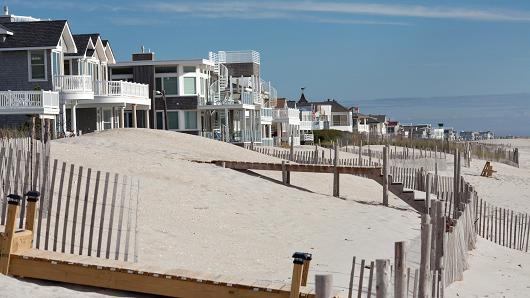-CNBC Real Estate-
A sharp drop in vacation home sales last year may just be the tip of the iceberg. With the nation’s political future uncertain, real estate agents say buyers are leery of the economy and more hesitant to put money down on a discretionary purchase like a vacation home.
Sales of vacation homes in 2015 dropped 18.5 percent to 920,000 from the previous banner year, which saw 1.13 million sales, according to the National Association of Realtors. The median price of a vacation home that sold last year, however, jumped 28 percent to $192,000.
“The expanding pool of buyers amidst a dwindling number of bargain-priced properties led to tighter supply and fewer sales,” said Lawrence Yun, chief economist for the NAR. “Furthermore, the turbulence that hit the financial markets the second half of the year likely seized some would-be buyers’ available cash.”
In Hilton Head, South Carolina, real estate agent James Wedgeworth said the lower end of the vacation home market is still good, but anything over $1 million sits. And there is a lot of high-end product available.
“We’ve got more supply than you can wave a stick at. We’re running 18-months supply,” Wedgeworth said, referring to the high end of the housing scale. “Markets don’t like indecision, and there is a lot of political indecision.”
A six-month supply is considered balanced. The low end, he says, is at about a two- to three-month supply, as even the vacation home market suffers from the same lack of low-end inventory as the overall housing market nationally.
The strongest price appreciation in vacation homes was seen in the South, according to the NAR, particularly in Florida. That is for single-family homes, however. Much of Florida is seeing a condominium glut.
Vacation home sales accounted for 16 percent of all transactions in 2015 — down from 21 percent in 2014. Buyers used cash more often in 2015 and had a higher median household income ($103,700) than those in 2014 ($94,380), according to the NAR.
More than a third of buyers surveyed said they plan to use their property for vacations or as a family retreat (37 percent), 16 percent bought for future retirement plans and 7 percent bought as a rental investment, down from 11 percent in 2014.
“I think people aren’t in the second-home mode yet, they’re in the primary mode. Sales are better in Indiana than Hilton Head right now, and you can’t say that very often,” said Wedgeworth.
CNBC Real Estate

